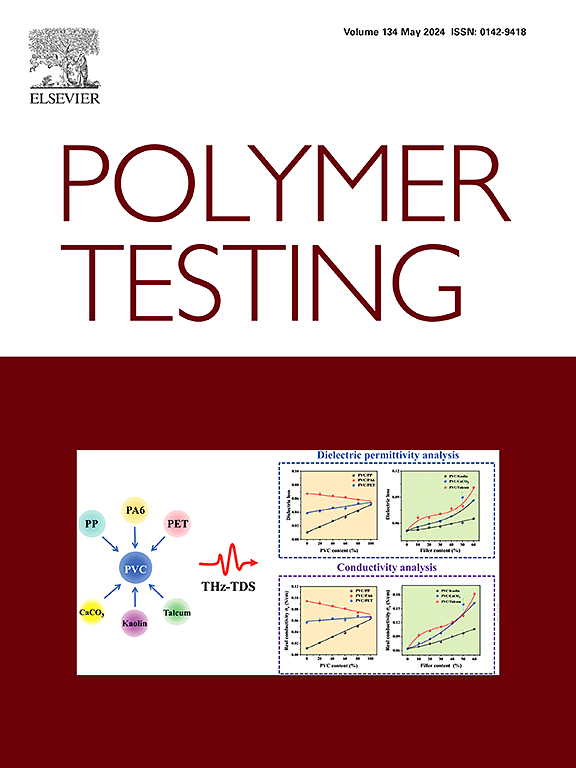利用原位 LIBS 方法监测聚酰亚胺薄膜的亚胺化反应
IF 5
2区 材料科学
Q1 MATERIALS SCIENCE, CHARACTERIZATION & TESTING
引用次数: 0
摘要
聚酰亚胺等高性能聚合物以其出色的化学和物理性能而闻名,在汽车、航空航天、医疗等高要求应用领域发挥着重要作用。聚酰亚胺薄膜在电子工业中尤其有用,可保护底层设备免受高温、潮湿、腐蚀性气体和高压的影响。因此,人们对聚酰亚胺的固化进行了广泛的研究,以确保理想的材料特性,而用于样品表征的新工具和新方法也引起了人们的极大兴趣。除了傅立叶变换红外光谱法(FT-IR)、热重分析法(TGA)或差示扫描量热法(DSC)等传统技术外,最近还引入了激光诱导击穿光谱法(LIBS)来监测聚酰亚胺薄膜的亚胺化反应。为了获得反应时间演变的信息,并优化耗费人力和时间的样品制备,我们开发了一种同时进行热处理和 LIBS 测量(原位实验)的加热室,并成功地用于自合成聚酰亚胺的亚胺化研究。除了对加热室设计的一般介绍外,还介绍了原位研究的结果:等温研究以获得单层薄膜亚胺化反应的时间信息,逐步加热以研究固化温度的影响。最后,LIBS 深度剖面图揭示了整个薄膜厚度的亚胺化程度的深度分辨信息,说明了 LIBS 技术的一大优势。本文章由计算机程序翻译,如有差异,请以英文原文为准。
Monitoring the imidization reaction of polyimide thin films using an in-situ LIBS approach
High-performance polymers like polyimides are well known for their outstanding chemical and physical properties and play an important role in high-demanding applications like automotive, aerospace, medical, etc. Polyimide thin films are especially useful in the electronics industry to protect the underlying devices from elevated temperatures, humidity, corrosive gases and high voltages. Therefore, the curing of polyimides has been studied extensively to ensure ideal material properties and new tools and methods for sample characterization are of great interest. Besides conventional techniques like Fourier Transform Infrared Spectroscopy (FT-IR), Thermogravimetric Analysis (TGA) or Differential Scanning Calorimetry (DSC), Laser Induced Breakdown Spectroscopy (LIBS) has been introduced recently to monitor the imidization reaction of a polyimide thin film. To obtain information about the temporal evolution of the reaction as well as optimize labor- and time-consuming sample preparation, a heating chamber for simultaneous thermal treatment and LIBS measurements (in-situ experiments) was developed and successfully used for imidization studies of self-synthesized polyimides. Besides a general introduction of the chamber design, the results of the in-situ investigation are presented: isothermal studies to gain temporal information about the imidization reaction of a single film and stepwise heating to investigate the influence of the curing temperature. Finally, LIBS depth-profiling revealed depth-resolved information about the imidization degree over the entire film thickness, illustrating one of the great advantages of the LIBS technique.
求助全文
通过发布文献求助,成功后即可免费获取论文全文。
去求助
来源期刊

Polymer Testing
工程技术-材料科学:表征与测试
CiteScore
10.70
自引率
5.90%
发文量
328
审稿时长
44 days
期刊介绍:
Polymer Testing focuses on the testing, analysis and characterization of polymer materials, including both synthetic and natural or biobased polymers. Novel testing methods and the testing of novel polymeric materials in bulk, solution and dispersion is covered. In addition, we welcome the submission of the testing of polymeric materials for a wide range of applications and industrial products as well as nanoscale characterization.
The scope includes but is not limited to the following main topics:
Novel testing methods and Chemical analysis
• mechanical, thermal, electrical, chemical, imaging, spectroscopy, scattering and rheology
Physical properties and behaviour of novel polymer systems
• nanoscale properties, morphology, transport properties
Degradation and recycling of polymeric materials when combined with novel testing or characterization methods
• degradation, biodegradation, ageing and fire retardancy
Modelling and Simulation work will be only considered when it is linked to new or previously published experimental results.
 求助内容:
求助内容: 应助结果提醒方式:
应助结果提醒方式:


